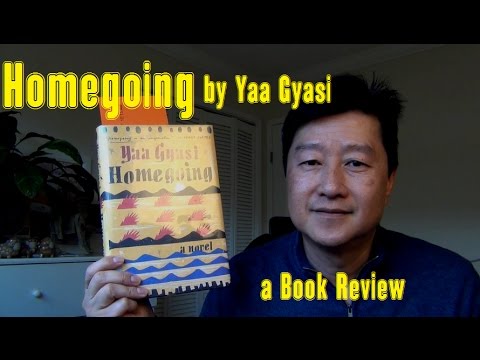Reading Homegoing is like eating at a Chinese banquet with 14 courses but each course could fill you up by by itself. And yet at the end, you feel completely satisfied, emotionally and intellectually enriched with what the black/negro human race went through last two hundred and fifty years or so. It’s like the modern version of “Roots” the movie and yet seem more realistic and multi-faceted like video recording the progressive scenes in many angles. The author captures the emotions with good usages of metaphors and descriptions, which in turn moves the readers in profound ways. Each of chapters or stories constitutes one episode of a series of 14 episodes. I can’t wait to see someone make them into a TV series.
The stories are hard to follow in the beginning as they happened about two hundred years ago and alternated between two genealogies, Effia and Esi the two half sisters, for which a genealogy chart on the first page comes in handy to reference occasionally during my reading book and listening to the audiobook. The audiobook narrated by Dominic Hoffman is fantastic with his slight African accent that seem to take on each character with fidelity.
I don’t usually read novels but this novel is a real treat even if you’re just remotely interested in the history of the negro race because in many ways they are stories of the underprivileged to nth degree. If the book doesn’t move you, then you’re either too stone-hearted to be in a human race or too numbed to feel the pain. To the most of us, I highly recommend this book.
Spoiler Alert: Stop here if you plan to read this book.
My key take-aways:
– The horrific condition of stacking hundreds of captured women slaves in the dungeon underneath the castle seem unbelievable. But it’s not surprising given the cruelty of slavery in itself.
– In fact, the slavery was already a common practice among the African tribes before the Whites started taking the black slavery and perhaps among the different white ethnics speak to the degree of cruelty the humans are capable of imposing. The roles of the black themselves contributing to the slavery was also explicit.
– During the Civil War, the awkward status of the blacks between the slave states and free states were captured in the book. Any black person can be kidnapped to be a slave in the southern slave states seem incredible to me. But that happened often as highlighted in two-shovel H’s story, who was falsely imprisoned in Pratt City, Alabama and turned into slaves digging in coal mines.
– Sometimes the betrayal of someone you love hurts no less than the hurt from the whites as in the case of Robert, the mostly white husband, to Willie, a religious, self-determined daughter of H.
– The underprivileged tend to be in a constant state of helplessness and get trapped in the drug abuse as in Sonny’s story. He could blame on abandonment of his father. But through the love and care of his mother, Willie and his son, Marcus, Sonny eventually won over drug abuse though precariously.
– Akua, the crazy woman, burned down her family hut because of her hallucination about this fire woman. Two of her children were burned to death and she was exiled out of the village after her husband, Asamoah the handicapped warrior stood out for her to save her life. Her son, Yaw, was sent to a remote place for schooling and came back to reunite with her after being a history teacher at his middle age. This story is a bit mystical but still believable.
– Yaw’s line of genealogy stayed in Ghana, Africa until he emigrated to Africa so you get a feel for what’s happening in Africa struggling for independence from England, while the other genealogy had descended from the slaves kidnapped to America struggling against injustice. The contrast between the two is interesting.
– I knew from the chart that there are two genealogies that will come together at the end. This kept me anxious to how the book will end. And I was not disappointed. The fear of fire and the fear of the water come together so beautifully at the end is a master piece.
Once again, the book offers a full course of history, vile human natures, and hope. And I am hopeful for the future of human race.
A few interesting youtube videos with the author Yaa Gyasi:

